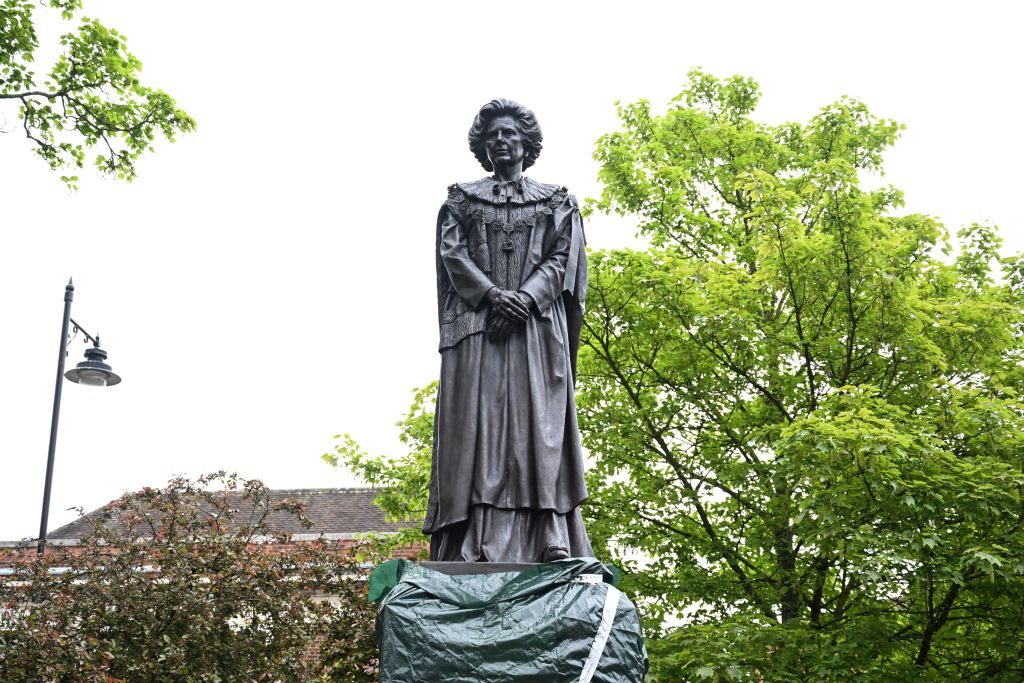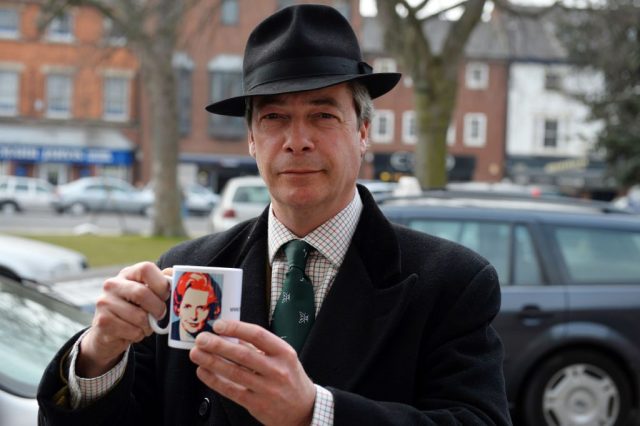‘If Thatcher’s vision for life in Grantham remains, the methods have had to change.’ Paul Ellis / AFP via Getty Images

When Margaret Thatcher sat down to write her memoirs, and explain how she came to transform her country, she found herself returning to Grantham. In particular, she reflected on the town’s triumphant civic processions, which still entranced the Iron Lady as she approached the end of her life. Here, she wrote, was “a great chain of people, stretching back into the past and forwards into the future” — the Boy Scouts, the Rotary Club, the British Legion — resplendent and eternal before the town hall where her statue now stands.
The inaugural Thatcher Fest is not exactly an ancient Grantham tradition. “It’s just a way of getting people into the town,” one Conservative councillor soberly explained. The festival’s events apparently offered something for everyone: Edwina Currie, Giles Brandreth, a drag queen doing a bit about Section 28. “Are you worried about protestors?” the leader of the council was asked by local news. “No I’m not, I want to know are they bringing in money, and are they spending it in the pub and the hotels?”
There were no protestors, but something the town found even more uncomfortable: a quiet trickle of devotees from all over the world. At 2pm we gathered near her statue. A dozen in all: a corporate vice executive from Dusseldorf; a young Tory boy (“he’s furious about the rise of Reform,” explained his attendant mother); a squat, belligerent woman from Sichuan who had, as she was keen to show me on her phone, been working on an amateur translation of Carol Thatcher’s memoir into Mandarin.
This was the most immersive of the festival events, a psychogeographic retracing of Thatcher’s childhood steps: fields where she might once have tobogganed in snow; the Methodist hall where her father once preached; the walk to school where she would spend the twice-a-day half-hour hike contemplating Grantham and its incarnation of England. Walking up the hill towards Thatcher’s old grammar, the market town was resplendent, triumphant in its autumnal colour, offering us for a briefest of moments that crucible of nostalgia and memory that once informed her vision of the country.
The historian David Cannadine certainly believed this was the case. “Thatcher’s social vision for Britain,” he wrote, “was in many ways Grantham writ large.” It was only through this time and place that her seemingly contradictory vision of the country could be properly understood. Her father’s shop was squarely on the High Street, literally in the twilight zone between well-heeled aspiration of England’s provincial bourgeoisie and the degradation of a nearby slum. It birthed an almost revolutionary conception of class and society: both hierarchical, with its “Burkean reverence” for petty provincial officialdom, but also one enterprising and disruptive, through which the “Victorian values” of hardwork, thrift, self-reliance and independence could be unleashed.
Cynicism toward Thatcher’s fondness for Grantham has reigned supreme in recent years, alongside a fondness for Peregrine Worsthorne’s quip that in “setting out to recreate the country of her father” she ended up creating the country of her son: dodgy businessman and sometime coup-plotter Mark. “Reheated Thatcherism” is now the ultimate insult in British politics, used to prod at a dying Tory corpse and undermine Reform’s push for power. But what this ignores, amid the apparently revolutionary temper of British politics, is the extent to which Thatcher and Grantham, as they exist today, still articulate our desires and revealed preferences.
-

The statue around which the devotees gathered. Paul Ellis / AFP via Getty Images
As the walking tour indulged in this Thatcherite mythos, there was a reverential mood — a sense that, in an era of looming upheaval, this was the last Prime Minister to seep out of the dour realm of scripted politics into the collective consciousness. In 50 years’ time, there will be no nosing around the streets of Durham in search of Blair’s youth, no life-size recreation of Keir Starmer’s bedroom, as the local museum once did for Thatcher. Our own politics, indeed our inner lives, are still entranced by the contradictions of her vision. In the end, most Britons still hope to live quiet but fulfilling lives in market towns like Grantham, with their historic centres and abundant suburban shopping centres. We want both family and independence. Tradition and meritocracy, freedom and security, prosperity and community, history and an enduring relevance to the outside world.
Behind the scenes of the Grantham festival, a struggle to represent these interests was taking place. “If we lose Grantham,” Gareth Knight of the local Conservative Chairmen’s Association tells me, “I’m not sure what we have left as a party.” During this year’s Lincolnshire County Council election, Reform took 44 out of 70 seats, part of a quiet realignment of defections and local contests taking place across provincial England. Then, in July, came yet more symbolic defections, including former town mayor Graham Jeal, the man who’d worked to bring the statue of Thatcher from Westminster to Grantham.
If Thatcher’s vision for life in Grantham remains, the methods have had to change. A statement issued by the local Reform Party regarding the festival, amid its recent triumph, is both celebratory and distancing. “Mrs Thatcher,” it read, “is now an important historical figure rather than one that informs the challenges of 2025.” A new “post-liberal conservatism” is apparently the cure for Britain’s malaise: “One that spends its money wisely, backs domestic industry, and rebuilds resilience — not the managerial state that meddles in every aspect of life.”
When I asked Jeal to expand, he talked only of the excitement of this new endeavour. “It’s like working for a startup,” he says during a 30-minute phone call in which he mentions the word growth 22 times. “I think that Reform is clearly attracting people who have never voted before, so there’s a whole new constituency coming forward.” In this, Jeal’s pitch is similar to one Farage has tried out from the Welsh Valleys to the Dorset shires: a blend between lowering corporation tax for small businesses and rebuilding state capacity. It is, as sociologist Dan Evans describes, the most important class divide of the 21st century — between global and family capital — expressed in the “frenzied fear of falling from the lower middle class”.
Despite this more statist pitch, Reform has nonetheless just dropped its £90 billion programme of tax cuts, after stern criticism by the Institute for Fiscal Studies. In Grantham, the party’s supposed profligacy offers the Conservative its final, desperate line of attack. To old Tory voters, it’s seen as a “statist, Left-wing party”, says Gareth Knight, among the few aspirational burghers left in Grantham who still cling to the familiar brand of grocer-shop accounts. It’s the Labour areas of the town, he insists, that Reform is sweeping up — and for the Conservative Party to survive here, it’s about tying Reform to the statism, and indeed, the old snobbery, of Thatcher’s distinction between those in the town “who drew salaries from white-collar employment and those who did not”.
What of Labour in Grantham? In the last election, they came second, despite Reform eating up most of the Tories’ losses with a 20% swing. Perhaps one of the biggest misconceptions about Grantham, and indeed Thatcher’s recollection of the town, is its industrial heritage, which Reform is now trying to court. Its munitions factory saw it targeted by the Luftwaffe, and full employment continued well into the Sixties. Today, light industry still exists in Grantham and the rest of South Lincolnshire. One notable example is the area’s niche in garden conservatories: typical, perhaps, of its provincial aspirations, yet one crippled by high energy costs. But symbolically, at least for Reform, its mix of entrepreneurism, state enterprise and market town aesthetics is a way of bridging a new divide between the old Tory establishment and the Grantham’s disenfranchised blue-collar workers.
Confronted with this rising coalition, the local Labour Party shares one thing with its old rivals: if Thatcher is capable of uniting a Tory Party potentially entering its death throes, she’s even better at bringing together an increasingly irrelevant Labour. In the Grantham Railway Club, at the “alternative” Thatcher Fest, a rejected scene from a Ken Loach film unfolds. Billy Bragg’s “Thatcherites” is strummed out by a pair of greying folk-rockers. The audience is similarly frail and nostalgic for misery and hardship. A portly, bearded retiree presents me with poems of fastidious bleakness from his travels across the Midlands via buses and estates. “Could this be about Grantham?” I ask. “Yes, of course,” he says. The German corporate vice-president has turned up from the walking tour with a half pint of Madri, surveying the scene with the sort of morbid curiosity reserved for an unintentionally grisly amateur museum exhibit.
The local Labour Party chairman, Rob Shorrock, a teacher at the local college, offers a dose of realism on Farage’s hoped-for realignment. “At least one of the Reform defectors told me he voted for Blair in 1997. They get excited at anything.” The railway connection to London, he insists, is the real growth opportunity. “There’s also a shortage of skills,” he says, underpinned by the belief that a dose of pragmatic investment of infrastructure could yet breathe life back into an old Blairite instinct.
But there are deeper anxieties being courted, something the town seems almost to suppress should it ruin the fun of Thatcher Fest. When I asked one festival speaker about Thatcher’s legacy, the town and her desire to “separate the person from the politics”, she sent back a ChatGPT elegy of nonsensical buzzwords. Which begs the question you end up asking everyone at Thatcher Fest, to try and prise out the town’s hopes and fears: what would the grocer’s daughter herself make of Grantham today? The answers vary, from tour guide Dr John Manterfield (“lack of respect, a loss of independent shops”) to the Tory Party chairman (“the success of Right to Buy, the good grammar schools”). But Shorrock, outside the din of geriatric protest, likely gives the most fitting answer as Middle England faces up to this new struggle between the Tories and Reform: “Grantham still doesn’t quite know what it wants to be yet.”










Join the discussion
Join like minded readers that support our journalism by becoming a paid subscriber
To join the discussion in the comments, become a paid subscriber.
Join like minded readers that support our journalism, read unlimited articles and enjoy other subscriber-only benefits.
Subscribe